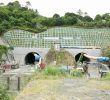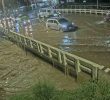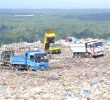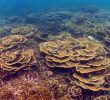Related story: In Many Davao Villages, Poison Pours from the Sky
DAVAO CITY — Coconut farmers from seven villages of Baguio and Calinan Districts are demanding the banning of aerial spraying of pesticides on banana plantations in their villages, blaming this method for the decrease in their yield.
Jun Alcomendras, a councilor in barangay Wangan, said at least 60 percent of the coconut farmers in the village have suffered economic loss after their crop rhino beetles attacked their coconut trees.
The infestation, Alcomendras said, can only be blamed on the aerial spraying practice of banana plantations. He said the synthetic chemicals used affect the natural balance in the environment.
This claim was also backed by the environmental non-government organization Interface Development Interventions Inc. (Idis). The group found out that because of synthetic chemical used in aerial spraying, a fungus that preys on the beetle are eradicated thus the explosion of the beetle�s population.
�The unnatural proliferation of the beetles came because of the destruction of the balance in the environment. Studies showed that a fungus called GSM, which is the number one enemy of the beetles, are eradicated because of aerial spraying,� said Ann Fuertes, Idis environmental research specialist.
Banana plantations practice aerial spraying to control sigatoka, a fungus that affects the leaves of the banana plants. The chemical used in the practice is Dithane which contains Mancozeb, a chemical listed by the state of California as cancer-causing.
But while the real target is destroyed by the deadly chemical, other fungus are also affected by it.
�Synthetic chemicals are not selective. While they hit their target, they also leave collateral damage not only to other organisms which are in fact considered environmental friendly but also to human and to the environment in general,� Fuertes said.
As environmentalists all over the world celebrated the Earth Day last Saturday, coconut farmers from the villages of Wangan, Sirib, Tamayong, Dacudao, Balengaeng in Calinan District and Daliaon in Toril District put up an alliance which was later called Mamamayang Ayaw sa Aerial Spraying or Maas.
In Subasta, the farmers also formed the group Bantay Kabuhayan at Kalikasan or Bakal.
Precioso Yap, Bakal chairperson, said that their problems started in 2001 immediately after aerial spraying has been conducted in their village. Yap used to harvest more than 3000 nuts per harvest but now he would only average about 1500 nuts per harvest.
�Losing gyud kaayo. Na-obserbahan man gyud namo ang kadaut. Sa dihang nagsugod na sila ug aerial spray, nagsugod na pud ug kaputol ang mga udlot sa among mga lubi�mikunhod gyud ang among abot nga hasta gyud nakaaperkto sa among panginabuhi,� Yap said.
�Mao ning among obserbasyon sa sulod sa pila na pud ka-tuig. Wala pa kini�y scientific na konklusyon pero dako ang among pagtuo nga ang beetle nut nga gapeste sa among mga tanom nidaghan tungod sa kemikal nga dala anang aerial spraying,� Yap added.
Because of this, he said, they are demanding a stop to the practice and calls on the authorities to back this demand.
�Undangon na gyud ni ug atong tan-awon ug aduna bay pagbag-o nga mahitabo,� he said.
Maas, in a position paper, also urged Mayor Rodrigo Duterte to act on their concern appropriately.
The group said that the effects of aerial spraying were not only observed in the coconut trees but also in other plants and vegetables. (Idis)
Food









